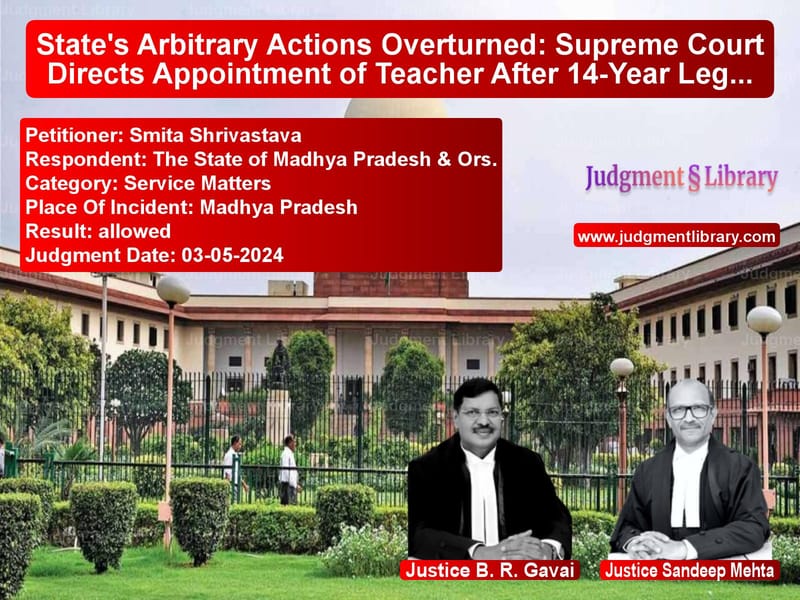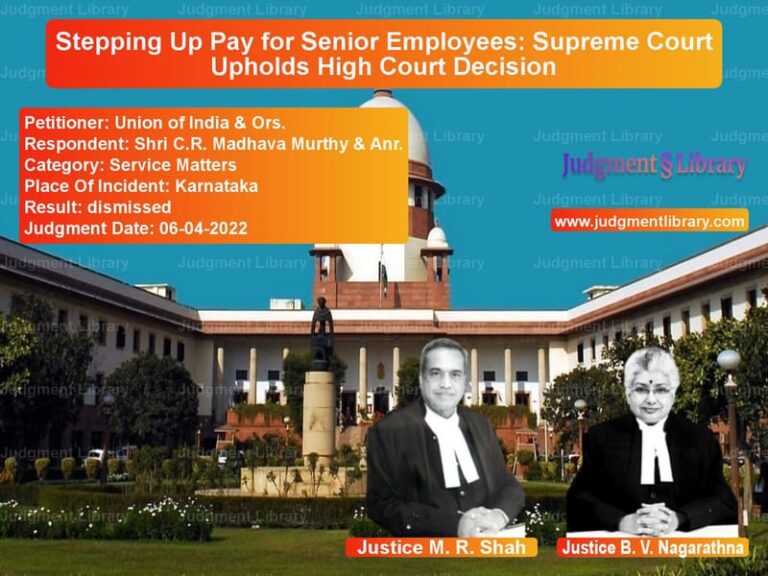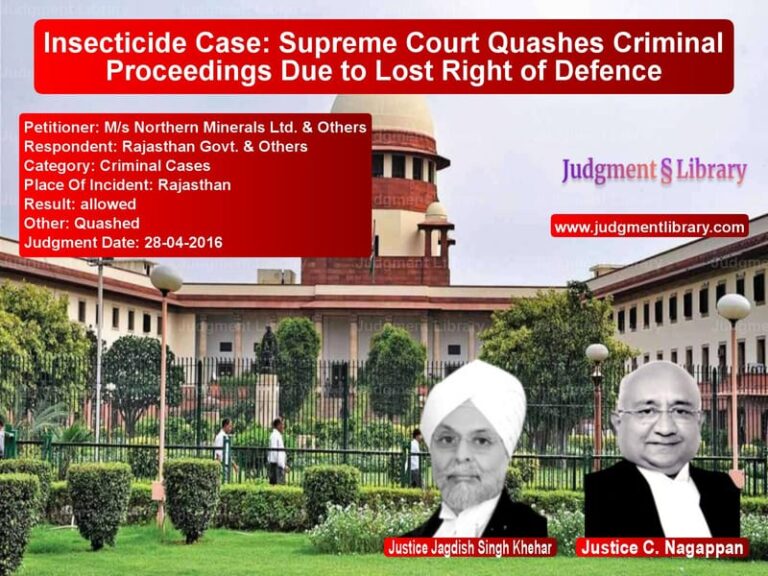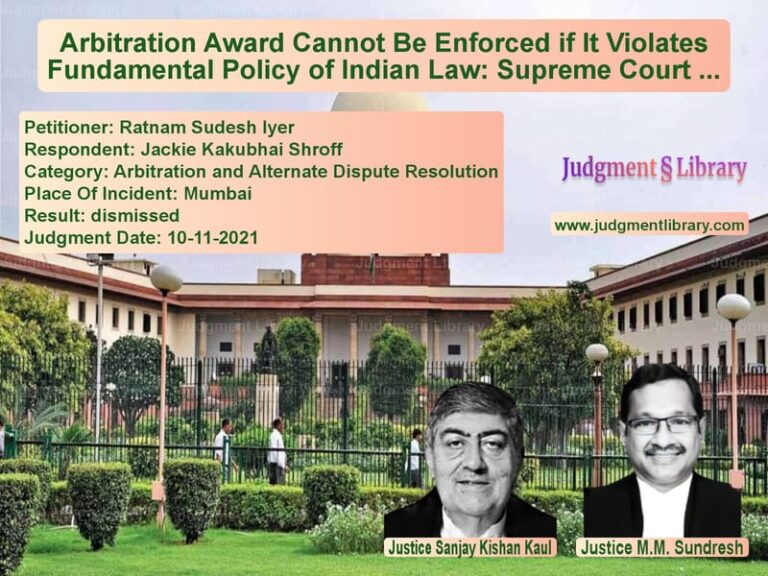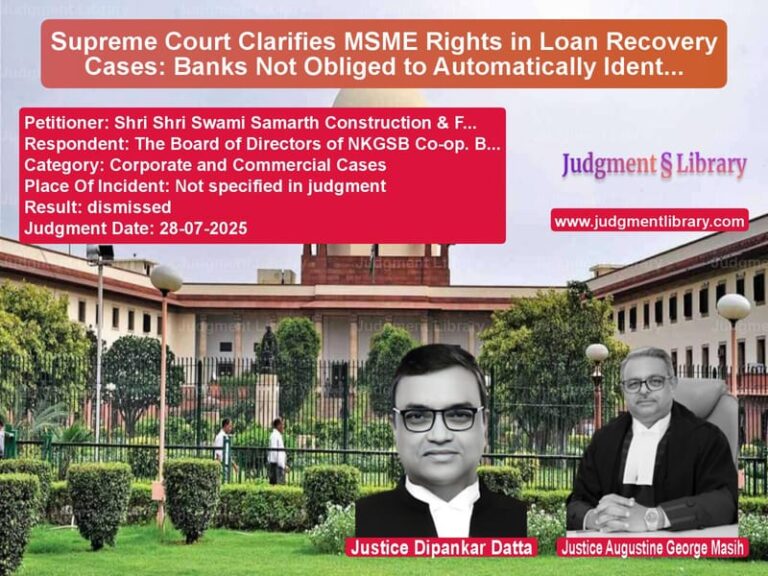State’s Arbitrary Actions Overturned: Supreme Court Directs Appointment of Teacher After 14-Year Legal Battle
The case of Smita Shrivastava vs. The State of Madhya Pradesh highlights the prolonged struggle of an individual against bureaucratic indifference and arbitrary governance. The appellant, Smita Shrivastava, fought for her legitimate appointment as a Samvida Shala Shikshak Grade-III (Contractual School Teacher) for more than 14 years. Despite multiple court rulings in her favor, the State of Madhya Pradesh persistently refused to appoint her, amending rules retroactively to deny her claim.
The Supreme Court, in its judgment dated May 3, 2024, condemned the state’s arbitrary and malicious approach. It ordered her immediate appointment along with exemplary compensation of ₹10 lakhs. The ruling also mandated an inquiry to recover this amount from the officials responsible for the illegal actions.
Background of the Case
Smita Shrivastava had been an Instructor in a Non-Formal Educational Centre run by the Madhya Pradesh government since 1990. However, her post was abolished on September 1, 1993. Later, in 2005, the state introduced recruitment rules for Samvida Shala Shikshak Grade-III. In response, she appeared for an exam on August 31, 2008, which she successfully cleared.
Despite her qualification, she was denied appointment. In 2009, the government amended the rules (Rule 7-A) to exclude candidates like her who had left service before a specific date. This was a clear attempt to retroactively disqualify her, forcing her into a long legal battle.
Legal Journey and Court Rulings
Smita initiated legal proceedings, and the Madhya Pradesh High Court ruled in her favor in 2012 and 2013, quashing the amendment and directing the government to appoint her. However, the state continued to reject her claim. The case escalated through multiple appeals:
- In 2014, the state government again rejected her claim despite the previous orders.
- She filed another petition in 2014, citing a precedent set by another case (Manmohan Mathur vs. State of M.P.).
- The High Court directed the government to reconsider her case, yet the state continued to deny her appointment.
- In 2018, the state issued another amendment making Rule 7-A effective from January 1, 2008, further cementing its refusal.
- The High Court, while acknowledging the injustice, merely ordered a compensation of ₹1 lakh instead of directing her appointment.
Arguments by the Petitioner
Smita’s counsel contended:
- The continuous amendments to Rule 7-A were arbitrary and intended solely to deny her appointment.
- Other similarly placed candidates had been appointed after court rulings, but she alone was denied justice.
- The High Court’s refusal to enforce her appointment, despite acknowledging the state’s malafide conduct, was unjust.
- The government had deliberately delayed her case until she became overage, making it impossible for her to seek fresh appointments.
Arguments by the Respondent
The State of Madhya Pradesh argued:
- Amendments to Rule 7-A were lawful and applied uniformly to all candidates.
- By 2018, the post of Samvida Shala Shikshak Grade-III had been abolished, making her claim unfeasible.
- The compensation awarded by the High Court was sufficient redress for any alleged injustice.
Supreme Court’s Observations and Judgment
The Supreme Court condemned the state’s conduct in no uncertain terms. The Court held:
“This case is a glaring example of the adamant, arbitrary, and high-handed approach of the State Government. Despite a clear-cut finding that the amended rule would not apply to the appellant, the state repeatedly rejected her legitimate claim.”
The Court relied on its precedent in Manoj Kumar v. Union of India (2024) 3 SCC 563, stating:
“The primary duty of constitutional courts remains the control of power, including setting aside of administrative actions that may be illegal or arbitrary. It is equally incumbent upon the courts to address the injurious consequences arising from such abuse of power.”
Key Directions of the Supreme Court
The Supreme Court issued the following directives:
- Immediate appointment: Smita Shrivastava must be appointed as Samvida Shala Shikshak Grade-III or an equivalent post within 60 days.
- Retrospective effect: The appointment must be considered effective from the date on which the first batch of selected candidates were appointed.
- Continuity of service: She will receive full seniority and benefits but not back wages.
- Compensation: She must be paid ₹10 lakhs as exemplary compensation within 60 days.
- Government inquiry: The state must investigate and recover the compensation amount from officials responsible for her denial of appointment.
Impact of the Judgment
The Supreme Court’s ruling in this case is significant for several reasons:
- It strongly reaffirms that the government cannot use retroactive rule changes to deny legitimate claims.
- It highlights the duty of courts to ensure justice beyond merely declaring actions illegal; they must also provide remedies.
- It holds individual government officials accountable for their arbitrary decisions, setting a precedent for future cases.
- It underscores the need for judicial intervention when state actions amount to a deliberate miscarriage of justice.
Conclusion
The case of Smita Shrivastava vs. The State of Madhya Pradesh is a testament to how bureaucratic high-handedness can rob an individual of decades of their life and career. The Supreme Court’s intervention has not only ensured her rightful appointment but also sent a strong message that courts will not tolerate state-sponsored injustice. The ruling stands as a milestone in reinforcing the principles of fairness, accountability, and administrative responsibility in India.
Petitioner Name: Smita Shrivastava.Respondent Name: The State of Madhya Pradesh & Ors..Judgment By: Justice B. R. Gavai, Justice Sandeep Mehta.Place Of Incident: Madhya Pradesh.Judgment Date: 03-05-2024.
Don’t miss out on the full details! Download the complete judgment in PDF format below and gain valuable insights instantly!
Download Judgment: smita-shrivastava-vs-the-state-of-madhya-supreme-court-of-india-judgment-dated-03-05-2024.pdf
Directly Download Judgment: Directly download this Judgment
See all petitions in Employment Disputes
See all petitions in Recruitment Policies
See all petitions in Public Sector Employees
See all petitions in Judgment by B R Gavai
See all petitions in Judgment by Sandeep Mehta
See all petitions in allowed
See all petitions in supreme court of India judgments May 2024
See all petitions in 2024 judgments
See all posts in Service Matters Category
See all allowed petitions in Service Matters Category
See all Dismissed petitions in Service Matters Category
See all partially allowed petitions in Service Matters Category

